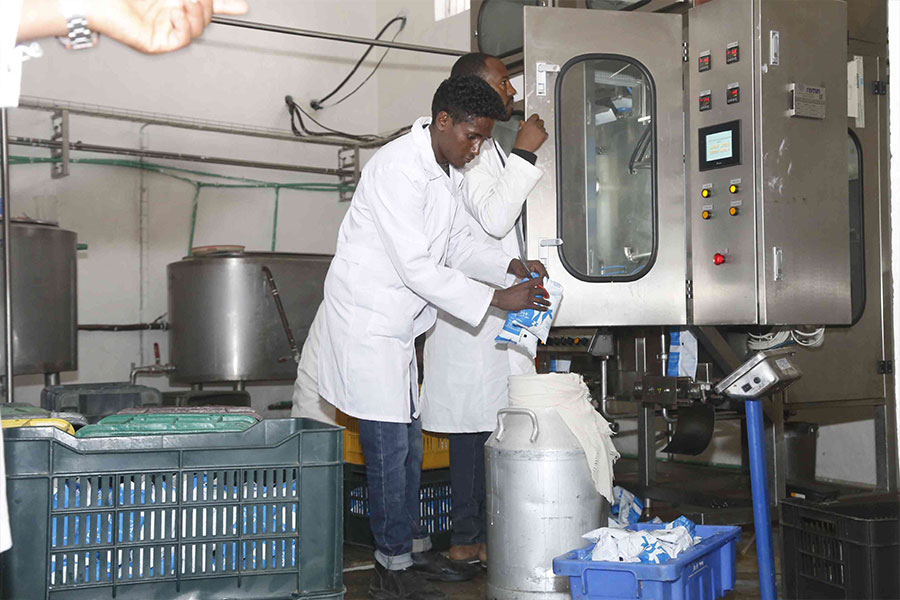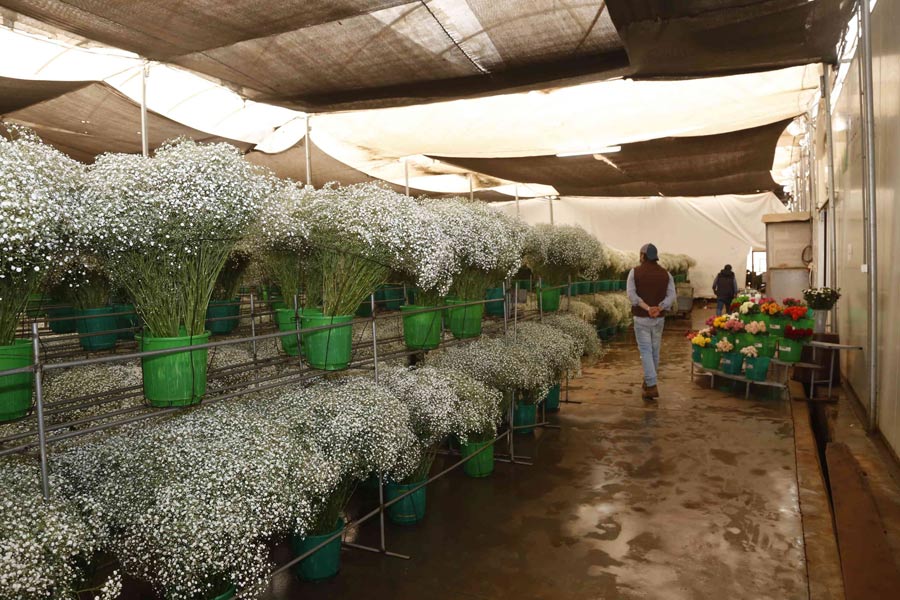
Ismael Nasser, 25, graduated from Addis Abeba University last year in mechanical engineering. Since his graduation, he has been searching for a job in the field of his study to no avail.
Two months ago he saw an advertisement on a flyer that he hoped would bring an end to his job search.
The flyer carried an advertisement for a private firm that trains people in candle making skills, which grabbed his attention and he soon found himself at the company's doorsteps.
The advertisement was by Addis Eyeta Business Consulting, located near Mexico Square, and offers a five-day training that helps people launch their own business making and selling candles with little startup capital.
Addis Eyeta has been offering the 2,500 Br candle making training for nearly a year and a half.
Ismael took the training, procured the necessary legal document of his rental agreement for the workspace and presented qualifying certificates from the Trade Bureau in his weredato secure his business license.
He launched his business with a new candle brand, Mahi, and embarked upon a candle making business a month ago.
For the past month, he has been operating from a rented facility around Ashawa Meda after investing a total of 40,000 Br.
He bought a locally-manufactured, candle making machine with a capacity of producing 36 pieces in 20 minutes. The machines cost 27,000 to 50,000 Br if manufactured locally, but the imported ones cost between 150,000 Br and 200,000 Br.
The raw material used in manufacturing candles is wax or paraffin wax, a petroleum by-product.
The raw material used in manufacturing candles is wax or paraffin wax, a petroleum by-product.
“The company that trained us also supports us to market our candles. Sometimes they even buy from us and resell them," said Ismael.
Even though commercial candle making has only started recently, it is attracting more entrepreneurs like Ismael.
Emebet Tsegaye, trade registration and licensing system administrator at Kolfe Qeranio District's Trade Bureau, also attests to this.
"The number of people who come here to obtain their licenses to produce candles is increasing," said Emebet.
Along with the training, Addis Eyeta also makes candles with its own brand, Eyeta. Eyeta candles cost 3.70 Br a piece to produce and have a wholesale price that ranges from 4.70 to 4.80 Br.
Before it ventured into the training business, the company hired a mechanical engineer, an electrical engineer and a designer, according to Kibret Akasa, one of the managers at Addis Eyeta.
“The most popular candles are the white 40mm diameter candles, but we also produce designed and coloured candles,” Kibret said.
Candle making has also opened other business opportunities for companies that produce packaging material.
Burayu Packaging & Printing Industry, a company located in Addis Abeba mainly working in manufacturing cardboard boxes, trays and packets, produces packaging material for Addis Eyeta.
Candle making companies supply the product to large-scale wholesalers and retailers. Yeshihareg Dinku, who has been selling candles from outside St. Qusquam Church in Aqaqi Qality District for about two years, is a street vendor retailing candles to the faithful.
Yeshihareg says that her business has been booming in the past couple of weeks as it is in the middle of the fasting season of the Ethiopian Orthodox and Catholic Christians.
"Normally, I sell most of my candles on Sundays," she told Fortune. "For the past two weeks, people are coming to churches almost every day and are buying candles from me."
She gets the big white candles for 6.50 Br a piece and sells them for eight Birr. The smaller candles are bought for 3.50 Br and she sells them for five Birr. She receives her products from wholesalers in Merkato, and sometimes the Church itself sells its excess inventory to street vendors like Yeshihareg.
"Recently, there are many kinds of candles that are being produced," she said. "I don’t know who is producing them.”
The Ethiopian Orthodox Church is a major consumer of candles used in its traditional liturgy.
G.Mariam H.Mikael, a priest at St.Qusquam Church in Qality District, observes a quality problem in the candles that are in the market and the rising cost of candles.
“In the past candles were cheaper and burn for much longer," he said. "Now, a candle costs 10 Br a piece and burns out even before we finish our liturgy.”
Yeshihareg also shares the priest's view, saying that most of the products in the market are fake with similar packaging as the brand names but of lower quality.
"Most of the candles in the market burn out quickly,” Yeshihareg said.
Sidco Candle Factory, a well-known candle maker since 1967 around Tor Hailoch, is one of the companies that is concerned with the fake products that are sold with similar packaging as theirs.
Sidco is one of the 31 companies that are registered at the Ministry of Trade & Industry to manufacture candles and tuaf, special liturgical candles made from beeswax.
"We're airing television commercials to help our customers and prevent them from being cheated by similar products," said Enani Negeo, executive secretary and assistant manager at Sidco.
"The quality issue with the fake products that mimic our candles will profoundly damage our reputation. Also, people are complaining about our candles, saying that our products burn out fast," Enani said.
Ismael and Kibret argue that their products are of good quality, and they are selling their products under their own brand name.
Although the Ethiopian Standard Agency does not have a standard on candles, we think our product is equal to candles from other big factories," said Kibret, an opinion echoed by Ismael.
"I don't think there is that much of a quality difference between the candles that are produced in large factories and what we produce," Ismael argues.
"On top of this, we do not have a market problem," added Kibret. "We're selling all that we make."
Beyond creating choices in the market and substituting imports, these businesses have a role in reducing unemployment, according to Habtamu Berhanu (PhD), a lecturer at Addis Abeba University's School of Commerce.
In 2017 the country spent 517,000 dollars to import candles.
Habtamu adds that the government has to help local companies to create linkages with raw material suppliers and the market. They should also be encouraged to upgrade themselves to medium-scale companies, according to him.
"Most of them don’t want to graduate from small-scale enterprises, because they want the benefits of the low expectations,” Habtamu said.
PUBLISHED ON
Apr 26,2019 [ VOL
20 , NO
991]

News Analysis | May 25,2024

Commentaries | Mar 18,2023

Advertorials | Mar 13,2019

Commentaries | Nov 19,2022

Agenda | Jun 07,2022

Fortune News | Oct 01,2022

Radar | Jan 31,2021

Viewpoints | Mar 18,2023

Fortune News | May 02,2020

Fortune News | Dec 30,2023

Dec 22 , 2024 . By TIZITA SHEWAFERAW
Charged with transforming colossal state-owned enterprises into modern and competitiv...

Aug 18 , 2024 . By AKSAH ITALO
Although predictable Yonas Zerihun's job in the ride-hailing service is not immune to...

Jul 28 , 2024 . By TIZITA SHEWAFERAW
Unhabitual, perhaps too many, Samuel Gebreyohannes, 38, used to occasionally enjoy a couple of beers at breakfast. However, he recently swit...

Jul 13 , 2024 . By AKSAH ITALO
Investors who rely on tractors, trucks, and field vehicles for commuting, transporting commodities, and f...

Jun 28 , 2025
Meseret Damtie, the assertive auditor general, has never been shy about naming names...

Jun 21 , 2025
A well-worn adage says, “Budget is not destiny, but it is direction.” Examining t...

Jun 14 , 2025
Yet again, the Horn of Africa is bracing for trouble. A region already frayed by wars...

Jun 7 , 2025
Few promises shine brighter in Addis Abeba than the pledge of a roof for every family...